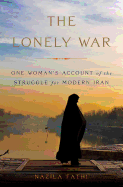
Nazila Fathi was nine years old when the 1979 Islamic Revolution occurred in Iran, replacing the Shah, Mohammad Reza Pahlavi, with Ayatollah Ruhollah Khomeini's hard-line Islamist government. For affluent, Westernized families such as Fathi's, the revolution brought terrifying changes: the loss of jobs, the banning of Western films and books and a sharp decline in personal freedoms (especially for women). But for millions of poor Iranians (male and female) who supported the new government, it meant economic opportunity and a chance to improve their place in society.
Fathi's memoir, The Lonely War, examines post-revolution Iran through the lens of her experience as a university student, a translator for American journalists and later the longtime Tehran correspondent for the New York Times. She explores the effects of the regime's harsh policies on ordinary Iranians, balancing stories of raids and imprisonment with chronicles of day-to-day life. She recounts interviews with top political figures, both pro- and anti-regime, and includes the opposing perspectives of political prisoners and regime supporters (such as her family's housekeeper).
During the 2009 popular uprisings, Fathi came under surveillance by the government. Forced to flee the country with her husband and children, she remains in exile, and her book is full of love and longing for the country she left behind. Fathi's memoir, like Iran's history, presents no easy answers to her country's political and social problems, but it paints a vivid portrait of a nation struggling to reinvent itself after years of oppression. --Katie Noah Gibson, blogger at Cakes, Tea and Dreams

